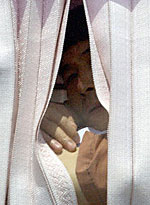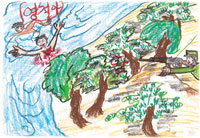




SEOUL—The authorities in North Korea are in the process of a large-scale crackdown in regions of the country near its border with China, forcing hundreds of residents to move further inland in an attempt to stop people leaving and carrying out public executions, a Seoul-based activist told RFA.
"North Korean residents are referring to the occurrence as a spring cleaning," Chul-hwan Kang, director of the Democracy Network against North Korean Gulag, told RFA's Korean service.
"The North Korean government is arresting all the people who have connections with China and sending them inland. Some people are on the expulsion list just because they have cellphones," Kang said.
He said defectors arriving in South Korea had brought video tapes of life inside the isolated Stalinist country, and those who had good connections in China would also help more North Koreans leave for a third country.
"There was also an incident where a wall poster of Kim Jong Il was destroyed in Hoiryung [in the northern border region]," Kang told RFA.
"Against this background, the North Korean government launched an inspection team aimed at detecting counterrevolutionaries in the Hoiryung and Moosan areas, in Hamgyung Province, creating mayhem in the area," he said.

Kang said defectors had reported that at least 60 families, or 200 people, had been sent to cities further south in the province, like Jangjin and Bujun.
He said the authorities were targeting people who were related to defectors and escapees.
Hundreds of thousands of North Koreans have crossed the border into China, fleeing famine and political repression in the hardline communist state.
Groups of North Korean defectors frequently storm foreign missions and schools in China in the hope of winning political asylum and passage to a third country.
While China has allowed a small number of such defectors to leave on the pretext of seeking medical treatment, it routinely incarcerates and repatriates North Korean refugees, who face imprisonment and even execution on their return.
I think maybe the North Korean economy is as bad as it was in the late 1990s and the government is employing public execution as a tool to control North Korean people.
While rights groups slam Beijing for not abiding by UN international agreements on refugees, China--which fears a flood of refugees should the regime lose its grip on power--says the North Koreans are illegal immigrants, sent home under a bilateral agreement with Pyongyang.
Kang said three people were publicly executed in the border area after being convicted of human trafficking.
"The border areas are reportedly greatly threatened by the North Korean government’s inspection team. In the case of the Moosan area, the North Korean government is attempting to eliminate bribery by bringing about a total change in the border patrol groups," he said.
"Because of this kind of monitoring, people are scared to breathe in the Moosan and Hoiryung areas."
Kang said the re-emergence of public executions could indicate an economic situation as poor as during the famine years of the late 1990s.
"I think maybe the North Korean economy is as bad as it was in the late 1990s and the government is employing public execution as a tool to control North Korean people," he told RFA.
Kang said the inspection teams were probably ordered by leader Kim Jong Il, and were a joint effort on the part of the police, the National Security Agency and the judiciary.
"Kim wants to eradicate all problems in the border areas."
"The people who work on the team are not local people for reasons of reliability. The government selects non-local people to compose the group, and dispatch the team to a specific area to inspect people," he said.
"The inspection team monitors not only civilians but also the military personnel who work in the border area. Those soldiers who have changed their attitude are deemed problematic and are forcibly discharged."
Original reporting by RFA's Korean service. Produced for the Web in English by Luisetta Mudie.